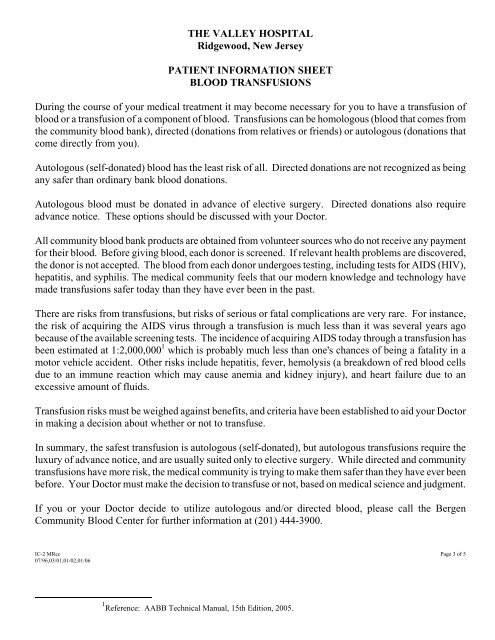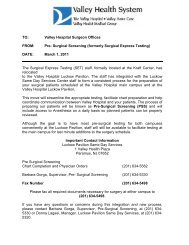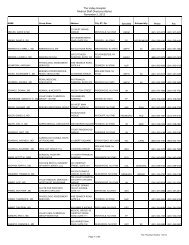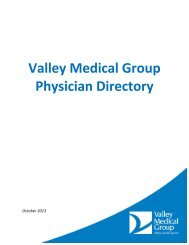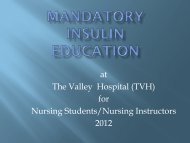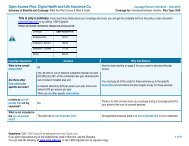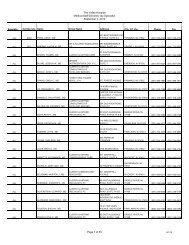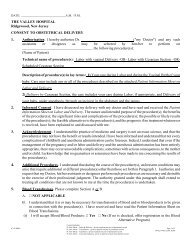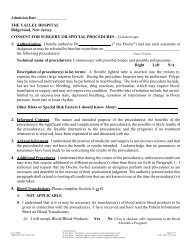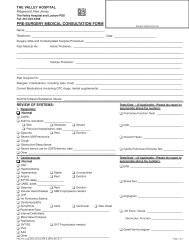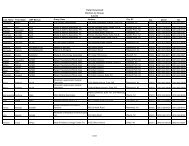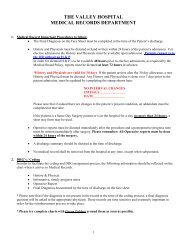Thyroid FNA Ultrasound Consent - Valley Hospital
Thyroid FNA Ultrasound Consent - Valley Hospital
Thyroid FNA Ultrasound Consent - Valley Hospital
Create successful ePaper yourself
Turn your PDF publications into a flip-book with our unique Google optimized e-Paper software.
THE VALLEY HOSPITALRidgewood, New JerseyPATIENT INFORMATION SHEETBLOOD TRANSFUSIONSDuring the course of your medical treatment it may become necessary for you to have a transfusion ofblood or a transfusion of a component of blood. Transfusions can be homologous (blood that comes fromthe community blood bank), directed (donations from relatives or friends) or autologous (donations thatcome directly from you).Autologous (self-donated) blood has the least risk of all. Directed donations are not recognized as beingany safer than ordinary bank blood donations.Autologous blood must be donated in advance of elective surgery. Directed donations also requireadvance notice. These options should be discussed with your Doctor.All community blood bank products are obtained from volunteer sources who do not receive any paymentfor their blood. Before giving blood, each donor is screened. If relevant health problems are discovered,the donor is not accepted. The blood from each donor undergoes testing, including tests for AIDS (HIV),hepatitis, and syphilis. The medical community feels that our modern knowledge and technology havemade transfusions safer today than they have ever been in the past.There are risks from transfusions, but risks of serious or fatal complications are very rare. For instance,the risk of acquiring the AIDS virus through a transfusion is much less than it was several years agobecause of the available screening tests. The incidence of acquiring AIDS today through a transfusion hasbeen estimated at 1:2,000,000 1 which is probably much less than one's chances of being a fatality in amotor vehicle accident. Other risks include hepatitis, fever, hemolysis (a breakdown of red blood cellsdue to an immune reaction which may cause anemia and kidney injury), and heart failure due to anexcessive amount of fluids.Transfusion risks must be weighed against benefits, and criteria have been established to aid your Doctorin making a decision about whether or not to transfuse.In summary, the safest transfusion is autologous (self-donated), but autologous transfusions require theluxury of advance notice, and are usually suited only to elective surgery. While directed and communitytransfusions have more risk, the medical community is trying to make them safer than they have ever beenbefore. Your Doctor must make the decision to transfuse or not, based on medical science and judgment.If you or your Doctor decide to utilize autologous and/or directed blood, please call the BergenCommunity Blood Center for further information at (201) 444-3900.IC-2 MRec Page 3 of 507/96,03/01,01/02,01/061 Reference: AABB Technical Manual, 15th Edition, 2005.


